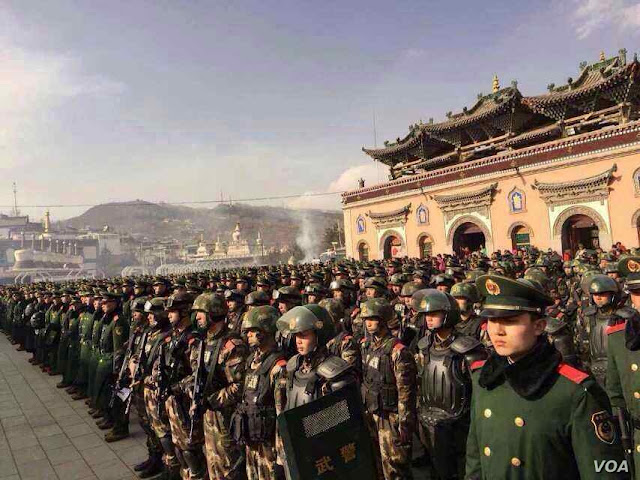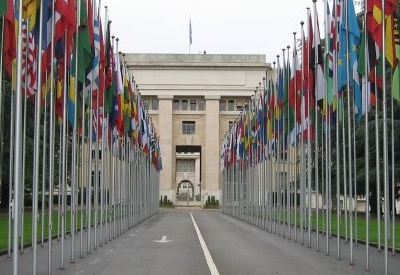Tibet in 2019
 |
| Chinese military presence at a Tibetan prayer festival |
Semantics are very important when discussing China and the Central governments modus operandi. While we think of China as having a single party electoral system of governance; socialist, communist, democratic or whatever, the essence is that it is a military juggernaut governing 1.4 billion people with one goal in mind- control. Now, that trait - control, is the purveyor of government from sea to sea; though, when we think of a democracy in the west, it bears to reason that free market economies exist to further strengthen the goal of an individual to obtain their maximum potential, thus, benefiting all parties in their quest for a good, productive life. Naturally, people being people require a tenable justice system, fairness in taxation, and respect for person and their property, including thought - so long as it does not interfere with others while they are also pursuing their goal of self - actualization.
So, when the Central government or PLA marches into Tibet recently and begins destroying the lives and culture of peace abiding citizens, as they say at NASA - "Houston, we have a problem." One could say that what is sorely lacking from the Central governments constitution is the notion that classical liberalism upholds: maximising the freedom of the individual while limiting the power of the government. This is evident in most, if not all democracies that operate with a bi-cameral political structure ensuring balanced representation along with an upper chamber to discuss legislation before it is sworn into law.
If we look at the Italian economist- Vilfredo Pareto (1848 - 1923) as a model figure to strive for an egalitarian formula, then our governments would be creating policies that maximise the greatest good for all with the effect on the smallest group being deleterious to their interests. In Tibet, the Central government has spent freely on Tibetan infrastructure that has seen GDP grow at an annual rate of 12% since 2001. The basis of this growth can be attributed to tourism, which has opened up the industry with the Qingzang Railway in 2006. While prima facie this would seem positive news for Tibetans and the economy of Tibet, it is prima facie benefiting many Han Chinese who are being parachuted in from the Mainland to fill those positions of need. And, the real issue is the ecological damage to the environment, which is as delicate as the rain forest. Chinese heavy equipment is turning parts of Tibet into a quarry that lay no respect for history, culture,wild-life and the environment. What with President Xi Jinping's quest for world economic dominance, particularly at the expense of China's neighbours, his promise not to continue militarising the Paracel Islands in the South China Sea continues unabated today, and an initial flogging of those guilty of the graft, make today's China boisterous and bullies with a Navy that includes Coast Guard vessels equipped for military combat, not rescuing troubled vessels.
In retrospect, scholars might agree that China's new found legs began with their incursion into Tibet with China claiming sovereignty over Tibet on January 1 , 1950. The normalising of relations between China and the U.S. in 1979 provided focus away from American interests in Taiwan (Republic of China) towards the Mainland. Deng Xiaoping opened the market to FDI and encouraged a stronger market economy post Tienanmen Square to instill cohesion through the public sector, while maintaining the growth and influence of SOE's (state owned enterprises.) Factor in the admission of China into the WTO in November 2001, and the current 137 million USD 2019 trade deficit tacked onto the existing 419 million USD trade deficit and an emboldened China is totally understandable. Height makes might in international relations. And so, the agreement by Italy to an infrastructure project through Xi's brainchild - the Belt & Road Initiative, seems peculiar with Italy as an EU member state. Reports this day (July 29, 2019) indicate that Italian Deputy PM Matteo Salvini is having second thoughts about this deal and has proclaimed Italy's relationship with Washington as a main priority. In the meantime, Tibet burns and the international community accepts that Tibet is part of China while many of us enjoy those terrific price points in our local shops owing to China - the factory of the world, the great outsourcer of "other" nation - states domestic employment.
Hong Kong is slated to be open to Chinese influence after the fifty year moratorium expires in 2047. The Central government reaffirmed its support for Carrie Lam and the Hong Kong SAR this week after protests continue on a regular basis in the aftermath of the now deposed, though not withdrawn legislation allowing for hongkonger's to be extradited and tried in Mainland courts.
The protesters want:
1) Chief Executive Carrie Lam to step down,
2) the extradition bill totally redacted,
3) stop calling the protests rioting,
4) waive all charges against those arrested
5) set up a non partisan commission to investigate the issues
6) begin the process of political reform, that ultimately concludes with independence from Beijing.
The Central government will have to give a little ground here, though they need to save face, particularly in the midst of international pressure vis a vis trade issues, militarization of the South China Sea and related acts of aggression, plus the ongoing saga of extra judicial matters relating to the two Canadians being detained, Michael Kovrig and Michael Spavor.
Mining has taken over Tibet and with it, the plundering of natural resources, the destruction of monasteries, and the interrogation and detainment of innocent monks and nuns practising a well established, peaceful existence. The monastic economy is being replaced with a version of capitalism incompatible with faith. Now, Tibet is getting lost in the dialogue concerning the U.S. - China trade standoff, the conflict in the South China Sea with China and its neighbours, and the potential military incursion by China into Taiwan. Despite this, the international community needs to remember the apartheid occurring in Tibet on a daily basis and lobby their heads of state and elected officials to adapt their Sino policies.
“The local authorities are mistrustful and dislike the strong bond between monasteries and the lay people; they try everything possible to break that bond”. - Exiled Tibetan 1
1 Free Tibet. "Tibet's Monasteries." 31 July 2019. <https://freetibet.org/tibets-monasteries>.
https://unpo.org/article/21601
Mining has taken over Tibet and with it, the plundering of natural resources, the destruction of monasteries, and the interrogation and detainment of innocent monks and nuns practising a well established, peaceful existence. The monastic economy is being replaced with a version of capitalism incompatible with faith. Now, Tibet is getting lost in the dialogue concerning the U.S. - China trade standoff, the conflict in the South China Sea with China and its neighbours, and the potential military incursion by China into Taiwan. Despite this, the international community needs to remember the apartheid occurring in Tibet on a daily basis and lobby their heads of state and elected officials to adapt their Sino policies.
“The local authorities are mistrustful and dislike the strong bond between monasteries and the lay people; they try everything possible to break that bond”. - Exiled Tibetan 1
1 Free Tibet. "Tibet's Monasteries." 31 July 2019. <https://freetibet.org/tibets-monasteries>.
https://unpo.org/article/21601
 |
| Yachen Gar being dismantled now after Larung Gar in 2016 |
 |
| ongoing mining activities |




